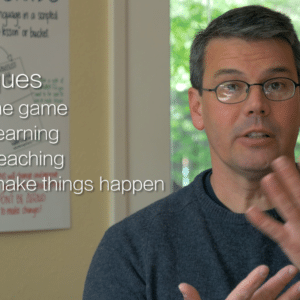
A contract, at the Sawtooth Huckleberry Fields, still honored to this day. (photo ©2007 Eugene Johnson)
In the midst of play, you or another fluency hunter spots a way to accelerate the learning environment. You enshrine it as a technique by giving it a catchy name, and contract it as part of play from now on.
Culture is an agreement between two or more people.
One of the major goals of WAYK is to empower and accelerate a culture of collaboration. Whatever road-blocks stand in the way, the techniques provide tested ways to remove them. It’s important for new players to feel part of the thriving community of collaboration as soon as possible – what are they observing about their experience of play that might improve the game?
Game leaders constantly look for the opportunity to maintain this culture of peer-mentoring, bringing new players into it. They are watching the newbies both to affirm that the game still works, and to discover ways to make it even faster by contracting new techniques.
You can judge whether or not it’s worth contracting a new technique, by whether or not the acceleration it creates is greater than the time spent marking it and explaining it in play. Another good sign that you’ve found a worthwhile technique to contract, is if it feels like a recognizable child of other fundamental techniques, such as obviously!, set-up, limit, and so on.
When players discover an opportunity to speed the game up, their first job is to agree on a catchy name. The best indicator of a good name is that it makes the players spontaneously chuckle or laugh out loud. If inventing a name takes more than a few moments, mumble a good-enough name for now – someone will improve on it later.
It’s also worth re-contracting more relevant names and technique variations for one’s own community. Sometimes, funny references that are memorable for one group, are completely lost on another. Part of the art of contract is discovering community in-jokes and cultural references that are just too funny or sticky to forget. Keep in mind too, that the more you make WAYK applicable to your community, the less it will apply to everyone else. As long as you maintain a knowledge of multiple dialects of play, this can work just fine.
Fluency hunters intrinsically only have enough information to contract new techniques for their WAYK proficiency level and below. A good rule of thumb for a self-check before contracting new techniques, or changing/re-contracting old ones, is: have you mastered the techniques that already apply to the present situation first? If you contract new techniques for situations that have already been “fixed” with previous ones, then you’re decelerating play by re-inventing the wheel.
So the most proficient fluency hunter present in a game is usually watching out for communicating techniques that already exist. Yet, inevitably, as communities of WAYK play emerge, isolated from others, different dialects will emerge, and in the end this works too. The more experimentation and play, the better.
It’s a matter of balance – through contract players have the power to improve the game, and yet the goal is to build on the work that has already been done, rather than reinventing the wheel. This tension between new techniques and old traditional ones will always exist, and it’s a dance that will always be part of WAYK.
Introducing the technique in language acquisition
Short: “Technique: Contract. Any time a player comes up with a good idea for accelerating play, we give it a name, and contract it as a new technique.”
Long: “The best names are funny and catchy, and make people laugh. But any name will do for now.”
Applying the technique in language acquisition
You’ll introduce this technique just in time for a new observation that emerges in play, that you judge will accelerate play. If relevant, it’s very important to give a new player credit for any technique based on observations (or complaints) that they’ve made – this brings them into the community of peer-mentoring.
But what about…?
It’s easy for new players to get excited and begin contracting techniques above their proficiency level, or perhaps contracting techniques for situations that are already covered by other techniques.
- tq Sorry, Charlie encourages players to stay within their fluency, and work on improving play at their level.
- But you can always tq Let it go, and try a new player’s technique, if you think that including their input will accelerate game play more than strictly avoiding unnecessary new techniques.




